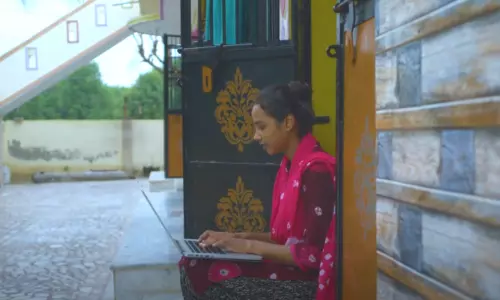Breaking Barriers: Inspiring Stories Of Women Entrepreneurs

In the realm of business, it is often said
that our response to adversity, not the adversity itself, shapes the outcome
of our journey. This holds especially true for women entrepreneurs who
navigate a landscape full of obstacles. With only 20% of businesses in the
country being owned by women, the 2019 Google-Bain report sheds light on the gender imbalance in
entrepreneurship in India. Notably, about 10-30% of these businesses are not actually
run by women, but by others seeking to exploit the benefits intended for
female entrepreneurs.
These challenges are compounded by societal
norms, an unequal distribution of responsibilities, and the uphill battle to
secure funding, access networks, and find mentors. A 2019 report by Innoven Capital highlighted that only about 12% of funded start ups
that year had a female founder, underscoring the significant gender disparity in
the business world. Investors are often reluctant to back women-run businesses,
and asset ownership among women remains alarmingly low.
In times of adversity, opportunities often emerge.
Several state governments have introduced initiatives focused on women
empowerment, such as Telangana’s WE Hub and Odisha’s Mission Shakti. The
Ministry of Micro, Small, and Medium Enterprises (MSME) has a policy mandating
government ministries and public sector undertakings to strive for 25%
procurement from MSMEs, including 3% from women-owned businesses. Schemes like
the Mahila Coir Yojana provide training to rural
women in coir spinning, enabling them to access support through the Prime
Minister’s Employment Generation Programme (PMEGP) for establishing their coir
spinning units.
Furthermore, the involvement of the private sector can
significantly enhance the positive transformation in women’s lives. To bring
real impact to women in rural areas and empower them through entrepreneurship,
inclusion and independence, Visa is collaborating with United Way Mumbai (UWM) for a multi-year program aimed at uplifting at least 8,500 women
micro-entrepreneurs. The program focuses on three core impact areas –
access to knowledge and services for financial inclusion, entrepreneurship
development, and formation of sustainable self-help groups. Operating in four
states in India, this partnership has already demonstrated substantial results
in the past fiscal year (2022-2023), reaching 244 villages and wards, and benefitting
over 8,800 women. These women have gained valuable
insights into financial and basic banking practices, acquired business acumen,
and now possess the capability to start their own businesses.
As the programme took shape, peer educators,
who were women from the same community, played an important role in establishing
trust with the women beneficiaries who were enrolling. They actively engaged with the women and their
families through street plays and outreach sessions, effectively promoting awareness
of financial literacy. Through their efforts, they have distributed course
materials and specialised budget diaries to over 5,500 women, facilitated
links to financial services and schemes for around 4,400 women, and conducted
training sessions in numerous villages and wards throughout the province.
An excellent example of the transformational
impact of these efforts is Namrita Das, a 39-year-old business owner from
Kamrup, Assam. Namrita, a homemaker, was struggling to make ends meet by
spinning Eri silk yarn for local firms. She lacked financial knowledge and was
underpaid, hence having limited involvement in household financial matters. The
Visa and UWM Kamrup team’s initiative
changed her mindset and introduced a newer perspective to her ambition.
Namrita has been actively working towards expanding her business, guided by the
UWM team’s strategic efforts. She is now managing her finances well, has begun
selling to local markets to increase her profits for further growth.
“Earlier, I used to weave
silk at only Rs 30 per meter. Now, with the support of the initiative, I sell
my products in the market and earn not only a higher weaving charge but also keep
the profits to myself. These profits have helped me reinvest in my business
and enabled me to provide better educational coaching for my children. My
husband also involves me in financial matters now.” – Namrita Das
Namrita
now understands the potential of the fashion industry. She is aware of the
international demand for Indian handcrafted textiles and aspires to export her textiles globally. Stories
of women like Namrita epitomise the success stories emerging from the Visa and
UWM collaboration. The partnership allows them to foster impact across India
continuously.
Challenges
on the path to entrepreneurship and financial independence persist, yet stories
like Namrita’s demonstrate that our response to these challenges shapes our
journey. Through these ongoing initiatives, more women like Namrita will not only
receive the necessary support they need but also become independent, empowering other
women to realise their dreams, and foster personal growth within themselves
and the community.